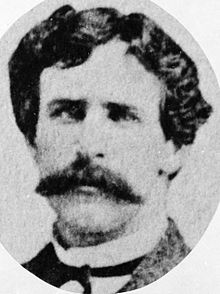Franklin J. Moses Jr.
| Franklin J. Moses Jr. | |
|---|---|
 |
|
| 75th Governor of South Carolina | |
|
In office December 7, 1872 – December 1, 1874 |
|
| Lieutenant | Richard Howell Gleaves |
| Preceded by | Robert Kingston Scott |
| Succeeded by | Daniel Henry Chamberlain |
| 27th Speaker of the South Carolina House of Representatives | |
|
In office November 24, 1868 – November 26, 1872 |
|
| Governor | Robert Kingston Scott |
| Preceded by | Charles Henry Simonton |
| Succeeded by | Samuel J. Lee |
| South Carolina Adjutant and Inspector-General | |
|
In office July 6, 1868 – December 7, 1872 |
|
| Governor | Robert Kingston Scott |
| Preceded by | Albert C. Garlington |
| Succeeded by | Henry W. Purvis |
| Member of the South Carolina House of Representatives from Sumter County | |
|
In office November 24, 1868 – November 26, 1872 |
|
| Personal details | |
| Born | 1838 Sumter District, South Carolina |
| Died |
(aged 67–68) Winthrop, Massachusetts |
| Resting place | Winthrop Cemetery |
| Political party | Republican |
| Spouse(s) | Emma Buford Richardson |
| Profession | attorney and politician |
Franklin Israel Moses Jr. (1838 – December 11, 1906) was a South Carolina lawyer and editor who became actives as a Republican politician in the state during the Reconstruction Era, elected as governor in 1872 and serving into 1874. Enemies labelled him as the 'Robber Governor', but a 21st-century biographer suggests his crimes were limited compared to those of later Democrat Ben Tillman, who contributed to murders of numerous blacks.
Although a secessionist before the war, Moses was ready to make alliances in the new society afterward. He served in the state legislature from 1868 to 1872, where he was elected as speaker of the House. He supported integration of the state university, establishing new social programs and public funding of old-age pensions, and created a black militia to help protect freedmen from white paramilitary insurgents. He was also unusual for hosting African Americans socially, both as governor and a private citizen.
When Moses was young, his middle initial was confused for the letter J, and thereafter he became known simply as Franklin J. Moses Jr.; his father also adopted use of the "J." His father Franklin J. Moses, Sr. was an attorney who served as a South Carolina state senator for more than 20 years; in 1866 he was elected as judge to the circuit court, and in 1868 as Chief Justice of the State Supreme Court.
Moses was born in 1838 in Sumter District, South Carolina, to attorney Franklin J. Moses, Sr. and Jane McLellan. His father was born and reared in a prominent Jewish family of Charleston of Iberian and German descent; and his Scots-Irish mother was a Methodist. Moses was raised as an Episcopalian and was never affiliated with Judaism, but he was widely regarded as Jewish because Southerners placed so much emphasis on paternal heritage; his political enemies tried to promote this perception as a tool against him. He enrolled at South Carolina College (now the University of South Carolina) in 1855, but was honorably dismissed from the freshman class the same year.
...
Wikipedia
